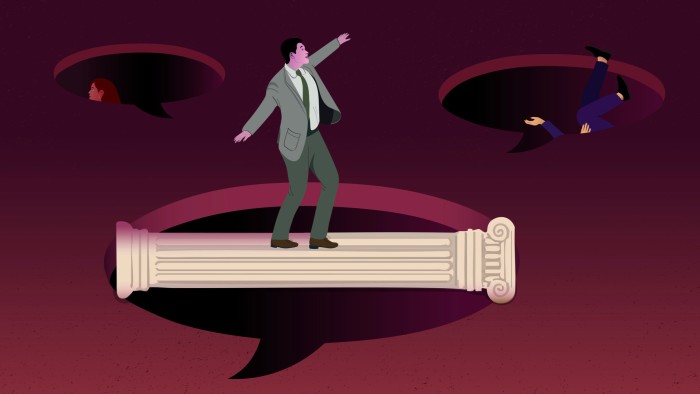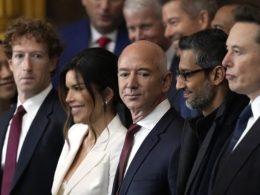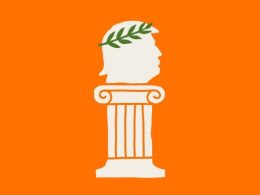Unlock the White House Watch newsletter for free
Your guide to what the 2024 US election means for Washington and the world
A couple of days ago, at the World Economic Forum in Davos, I heard a flock of global luminaries parsing this week’s inauguration of Donald Trump. Solemnly, over a dinner of grilled trout, they shared their fears about economic, political and geopolitical upheaval. Then one world leader turned to Ancient Greek.
“We have an epistemological crisis,” he declared, referring to the Greek words episteme (“knowledge”) and logos (“study of”). More specifically, different social tribes are now interpreting knowledge in such different ways that he fears “democracy is being undermined”.
Quite so. Never mind that Trump has haunted Davos this week with his deliberately provocative hyperbole that “weaves fact, fiction and fantasy” together, as Graham Allison, a Harvard professor, told me.
What is more notable are the findings of two recent surveys. One, conducted by the WEF, shows that for the second year in a row the meeting’s (mostly) elite delegates consider “disinformation” the biggest short-term global threat, above war and weather disasters. The issue did not even feature on the worry list before 2024.
The second poll, from the Edelman public relations group, shows that 61 per cent of people (in 28 countries) feel grievance towards governments, business and the wealthy — and 40 per cent support hostile action to force change.
Moreover, two-thirds think that business leaders, governments and the media deliberately lie to them, a sharp increase from recent years. The fact that Trump is lashing out at elites and experts — including scientists at the National Institutes of Health — reflects this. As one pro-Trump CEO told me after the US president delivered a bombastic address to WEF: “people are angry.”
So how should elites and experts respond? Judging from the Davos chatter, two responses predominate. Some business leaders (such as those in tech) are simply ignoring Trump’s “fictions” to cut deals. Others (like outraged progressives) are dismissing him and his supporters as deluded, stupid or evil — and wishing that Trump would disappear and/or regulators and Big Tech would “correct” lies.
However, I would suggest there is another route: leaders should ponder what they themselves can do to help heal this epistemological divide. How? There are several possible steps. The first is to engage in “deep listening”, to cite the concept championed by the journalist Emily Kasriel. That means hearing what Trump’s supporters are saying with as few preconceived filters as possible. We need empathy to understand why public grievance has exploded.
We also need this to grasp another point: many of Trump’s supporters believe that they are in a battle to save western civilisation — and with the same emotional intensity as, say, climate activists. That can’t be dismissed or scorned.
Second, if leaders want to restore public respect for expertise they must embrace the “error bar”, the long-standing scientific principle that researchers should honestly indicate their level of confidence in research results. This was forgotten during the pandemic, when politicians made dogmatic statements about medical issues (vaccines, for instance) — and sometimes curbed debate — even when the science was provisional.
That was understandable, perhaps, amid the panic. But it has contributed to public cynicism about “experts”, as the entrepreneur Peter Thiel recently noted in the FT. So leaders of all political stripes must embrace the error bar in future if they want to restore credibility.
Third, leaders must (as I have often written before) acknowledge that vertical trust — in authority figures and institutions — is collapsing today. Instead, people are increasingly relying on peer groups or local communities as sources of advice (in other words, on lateral trust relations). Leaders might hate this, but they must work with it — not wish it away.
Fourth, if you believe in the enlightenment principle of critical reasoning, you must put your money behind that. That means paying for quality journalism, backing intellectual inquiry at think-tanks and universities and promoting this in policymaking. For inspiration, look at 314action.org, a political action committee created by American scientists which aims to put more scientists into public office. It has already rallied thousands of volunteers. But far more could be done.
Fifth, leaders should champion initiatives to counter online misinformation. That does not mean using hierarchical power to crush free speech. But it does mean installing guardrails against violent activism and supporting community fact-checking platforms. These crowd-focused tools are now the main recourse against online lies, since Meta and others have decided to cut content moderation.
These steps are not a magic wand. But they are better than appeasement, despair and blame. The hard truth is that neither Big Tech nor government can or will fix the epistemological crisis. The responsibility sits with us all.
Source link









